Hispanic Heritage Month Film Festival
Every Thursday, from September 14th through October 12th at 6:30 p.m. in CLA 4310. Free admission — Films are either in English or Spanish with subtitles in English.
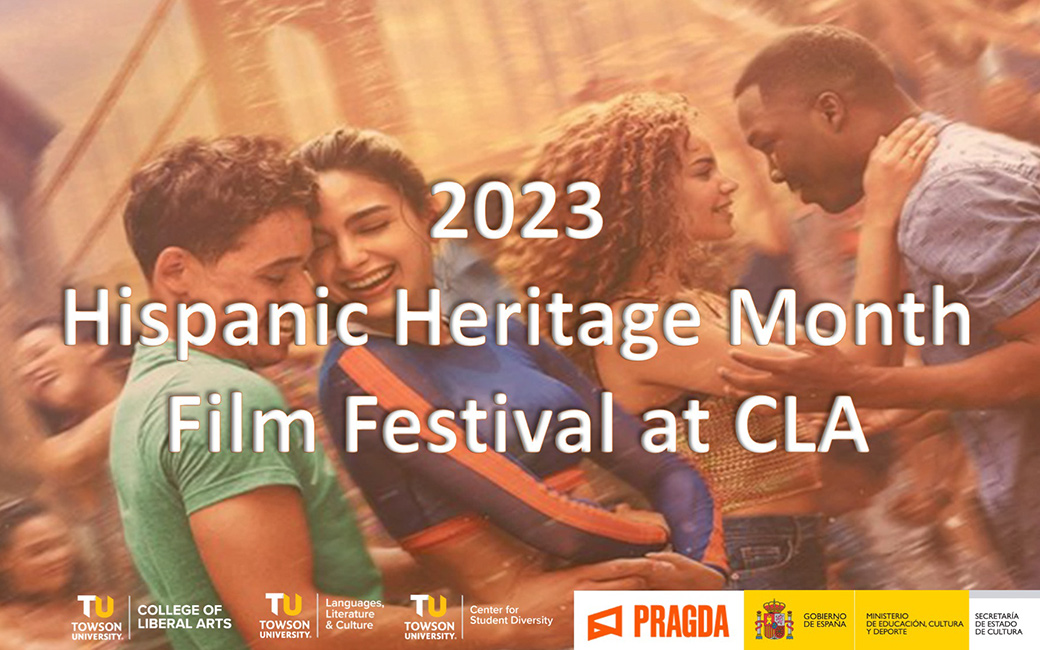
This year, the Department of Languages, Literatures and Cultures at Towson University is proud to organize and present the Hispanic Heritage Month Film Festival at Towson University. This event is possible thanks to the sponsorship of PRAGDA, the Spanish Film Club, the College of Liberal Arts, the Department of Languages, Literatures and Cultures, the Center for Student Diversity, along with the support of Sigma Delta Pi (the Spanish Honor Society) and faculty around campus.
This five-week event celebrates the richness and diversity of our community, showcased in acclaimed and beautiful films directed by Spanish, U.S. and Latin American directors. A common thread that runs through all the films is the importance of heritage in the identity of the Latin American and Latine/x community. But also, the persistence of displacement and diaspora in their experience.
Each film will be introduced by members of our Towson University community, and followed by Q&A. Samuel Kishi Leopo, director of Los Lobos; Gabriela Pena, director of Zoila, mi otra madre, and Amber Bemak, director of 100 Ways to Cross the Border, will be present, via zoom, after the screenings of their films, to answer any questions.
The films will be screened every Thursday at LA 4310 at 6:30 p.m., starting on September. Admission is Free. ALL FILMS ARE SUBTITTLED IN ENGLISH
Film Dates and Descriptions
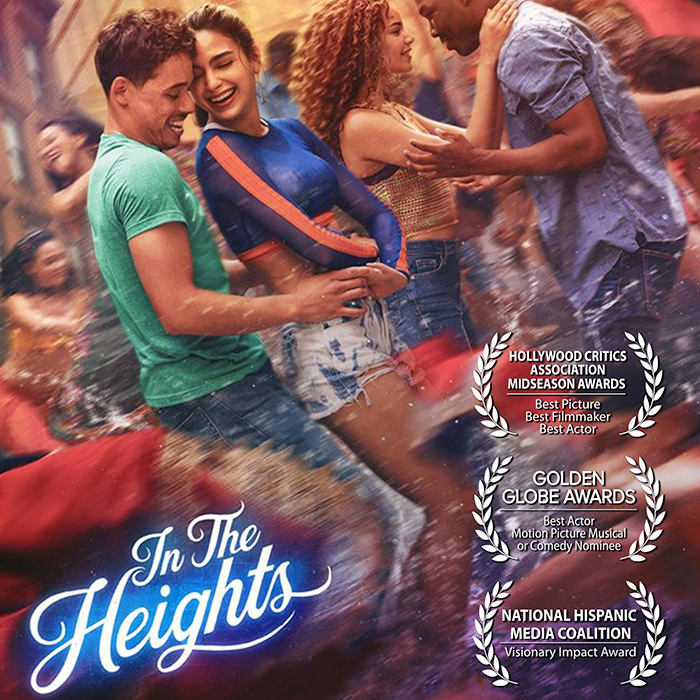
In the Heights
Dir. Lin-Manuel Miranda (USA, 2021)
Thursday, September 14 (6:30 p.m.)
This film will be introduced by Dr. Diana Saez, Assistant Professor in the Department of Music and Director of Choral Activities at TU. Followed by Q&A with Dr. Sáez.
An exuberant musical and visual feast created by Lin-Manuel Miranda, In the Heights
is a love letter to the Washington Heights neighborhood and an homage to the diverse
Latinx communities of Upper Manhattan.
The scent of warm coffee hangs in the air just outside of the 181st St. subway stop,
where a kaleidoscope of dreams rallies a vibrant and tight-knit community. At the
intersection of it all is a likable and magnetic bodega owner Usnavi, who hopes, imagines,
and sings about a better life. For him, the dream is not only to return to the happy
Dominican Republic of his childhood but also, to finally ask the intimidating Vanessa
out on a date. An aspiring fashion designer, Vanessa dreams of leaving her dead-end
beauty salon job and moving downtown to pursue her passion career. Smart college student
Nina yearns to reinstate her identity as a Latina on the heels of her dispiriting
year at the white-dominant Stanford. Ultimately, Usnavi and the residents of the close-knit
neighborhood get a dose of what it means to be home.
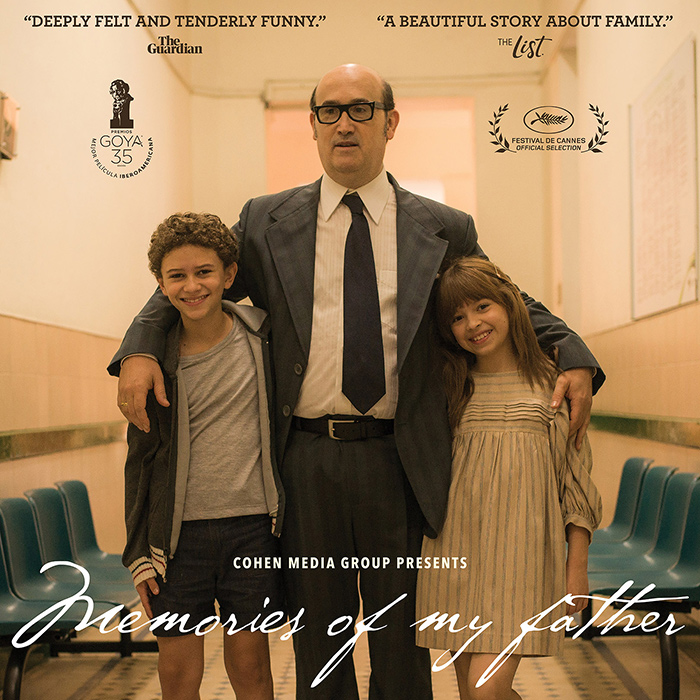
El Olvido Que Seremos
(Memories of My Father)
Dir. Fernando Trueba (Colombia, 2022)
Thur., September 21 (6:30 p.m.)
This film will be introduced by Alejandra Balcázar, Latine/x Coordinator from the Center for Student Diversity at Towson University. The film will be followed by a Q&A session with Alejandra Balcázar.
With Javier Cámara, Nicolás Reyes Cano, Juan Pablo Urrego
Based on the legendary book Oblivion: A Memoir by the Colombian writer Héctor Abad
Faciolince, and directed by Academy Award® winning director Fernando Trueba (Belle
Époque), the film tells of the life of the prominent doctor and human rights activist,
Héctor Abad Gómez (Javier Cámara), a father who is concerned about both his children
and children from less favored classes.
After a devastating loss in the family, Héctor gives himself to the greater cause
of public health programs for the poor in Medellín to the consternation of the city’s
authorities. The film straddles two eras: Faciolince’s adolescence in Medellín in
the 1970s, and his young adulthood in the ’80s up until 1987 when his father was assassinated.
“This is a wonderfully sympathetic, deeply felt and tenderly funny family drama with
a novelistic attention to details – a little like Alfonso Cuáron’s Roma, about growing
up in a similar era in Mexico City. Cámara thoroughly inhabits the figure of Gómez:
unselfconsciously inspiring and lovable.” – Peter Bradshaw, THE GUARDIAN
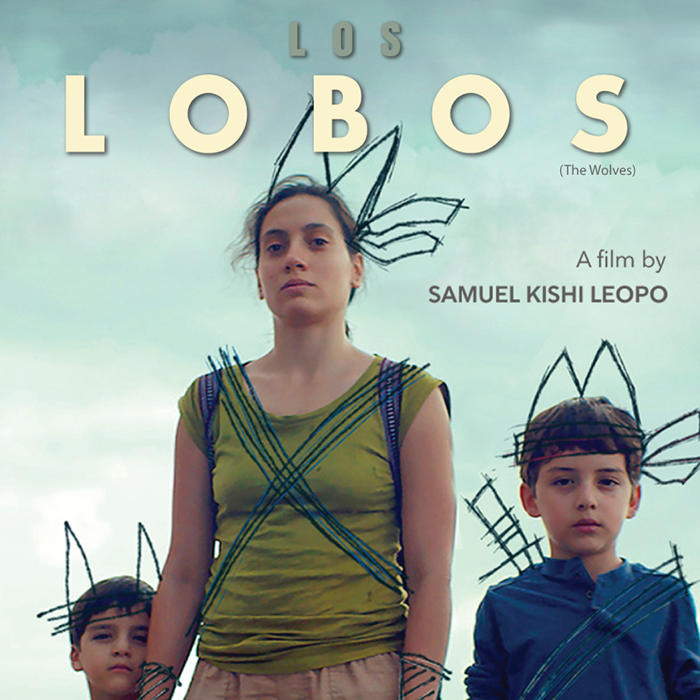
Los Lobos
Dir. Samuel Kishi Leopo (Mexico 2019)
Thursday, September 28 (6:30 p.m.)
This film will be introduced by Dr. Marcio Siwi, Assistant Professor from the Department of History. The film will be followed by a Q&A session with director Samuel Kishi Leopo via zoom.
With Martha Reyes Arias, Maximiliano Nájar Márquez, Leonardo Nájar Márquez, Cici Lau,
Johnson T. Lau
Following his success with We Are Mari Pepa, director Samuel Kishi Leopo approaches
a more personal topic in the moving autobiographical film.
With touches of The Florida Project, Los Lobos follows brothers Max and Leo who, together
with their mother Lucía, have just crossed the border from Mexico into the United
States in search of a better life. But it is not easy for them to gain a foothold
in their new home country. While waiting for Lucia to return from work, the kids build
an imaginary universe with their drawings and think about mom’s promise of “Disneyland”,
their land of dreams.
Told with unmatched authenticity, including powerful documentary footage mixed with
fiction and playful animation (reminiscent of the Puerto Rican coming-of-age masterpiece
We the Animals), Kishi Leopo’s film is unique and breathtaking. The film blossoms
into a wondrous adventure story as the two brothers gather the courage to venture
outside and explore the strange new world just outside their tiny apartment door.
Los Lobos is an absorbing coming-of-age story about migrant life through the prism
of its most innocent figures.

Zoila, Mi Otra Madre
(Zoila, my Other Mother)
Dir. Gabriela Pena
Thursday, October 5 (6:30 p.m.)
This film will be introduced by Dr. Emma Cervone, Lecturer in the Department of Languages, Literatures & Cultures. The film will be followed by a Q&A session with director Gabriela Pena via zoom.
Zoila’s home-movie aesthetic paints an intimate portrait of the titular Mapuche nanny
whose absence from the frame poses important questions about the maternal relationship
between her and the children she raised. Think Roma without the romanticization of
the indigenous maid.
Throughout the film, the filmmaker tries to capture the essence of what unites her
with her nanny, and also what separates them. Zoila’s figure was for too long like
a nebula, and to begin to understand it involved dismantling class, race, and gender
conflicts that coexist among them as ghosts.
The diversity of the footage also exposes a battle of narrators wanting to film their
history, which questions rigid ideas of parenting and expresses the genesis of a family
under reconstruction.
“I discovered that the tapes of my childhood that were intended to record our history
as a family omitted the existence of Zoila, a Mapuche woman who worked and slept in
the house, with whom I still have an intimate relationship. From this confusion, I
started a cinematic search to correct the absence of the previous images and to investigate
our relationship in the deepest sense. Zoila was the first person to know that I got
my period, but I had never pondered about her maternal role. Her figure was for too
long like a nebula, and to begin to understand it involved dismantling great class,
race, and gender conflicts that coexist among us as ghosts. Flying over our memory
and passing through our images. I tried to capture the essence of what unites us,
and also what separates us.” – Gabriela Pena, director
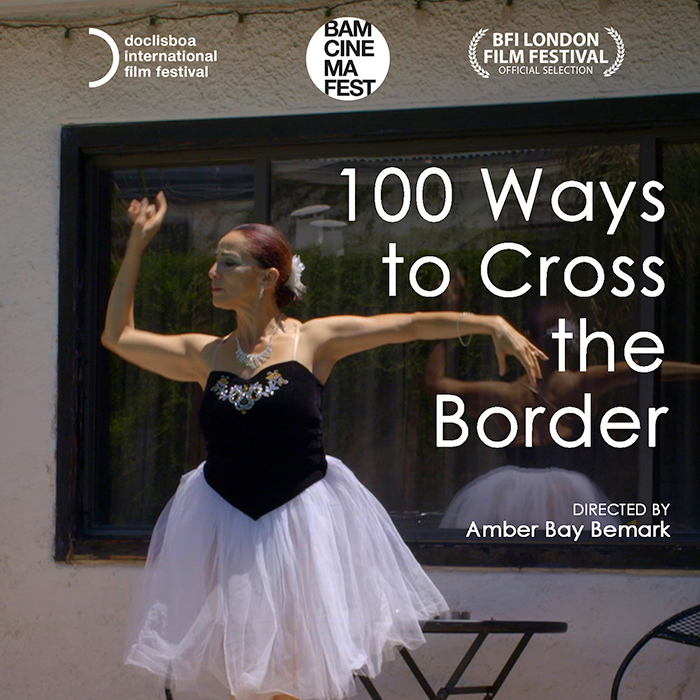
100 Ways to Cross the Border
Dir. Amber Bemak
Thursday, October 12 (6:30 p.m.)
This film will be introduced by Dr. Diego del Pozo, Associate Professor from the Department of Languages, Literatures & Cultures. The film will be followed by a Q&A session with director Amber Bemak via zoom.
This vibrant documentary celebrates Guillermo Gómez-Peña and the contribution his
radical, queer, anti-colonial art has made to conversations around border thinking,
gender politics, and Latinx identity.
‘I’ve been fighting to control my image for only 40 years and the fight never ends!’,
notes Gómez-Peña ironically, turning the camera for a moment on the film’s director
Amber Bay Bemak, reversing the gaze. The moment encapsulates their life as a Mexican/Chicanx
performance artist, activist, and founder of the trans-disciplinary arts organization
La Pocha Nostra (LPN), as well as Bemak’s approach as a documentary filmmaker.
Both attempted to queer all sorts of borders — not only territorial but also those
relating to race, gender, sexuality, and even filmmaking. With intimacy and honesty,
this film shares Gómez-Peña and LPN’s ethos and practice, creating an open space for
collaboration both behind and in front of the camera, resulting in a work that embodies
LPN’s multi-centric and fluid approach to narrative.
Acknowledgments
This event is possible thanks to the generous and kind support of:
- College of Liberal Arts
- Department of Languages, Literatures and Culture
- Pragda
- Spain Arts and Cultures
